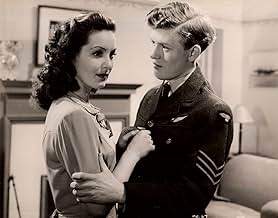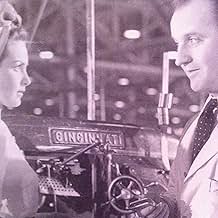Adicionar um enredo no seu idiomaA young woman called into service at a factory during World War II falls in love with a member of the RAF.A young woman called into service at a factory during World War II falls in love with a member of the RAF.A young woman called into service at a factory during World War II falls in love with a member of the RAF.
- Direção
- Roteiristas
- Artistas
- Mrs. Blythe
- (as Amy Vaness)
- Mrs. Hammond
- (não creditado)
- Brenda - Worker at the Factory
- (não creditado)
- Direção
- Roteiristas
- Elenco e equipe completos
- Produção, bilheteria e muito mais no IMDbPro
Avaliações em destaque
My father recruited workers in Missouri and Oklahoma for an ordinance plant during the war. Most of the workers he recruited--whom he personally put on trains headed north--were women who were happy to leave those depressed areas for higher pay, excitement and contribution to the war effort. Women were glad to go to work in factories, and in 1945 they were happy to give it up for marriage and so returning soldiers could have jobs. That's just the way it was then, and one can't put a different spin on how people behaved.
I hope to see this film again.
The theme is about the sacrifices made by the English during WWII, and the impact of the war on their lives. So many people ended up having their lives changes in ways that they didn't like, but the demand was to carry on. The story follows one family, and particularly the eldest daughter, who leaves home to work in a regional factory, meets and marries a young pilot.
Sounds trite? The film has a surprising balance of drama and war-time humour, and will be enjoyed by Beethoven fans. He should get a credit.
Although it is clearly a propaganda film in essence, this wartime drama is quite interesting for not being as simplistic as some of its peers. In this family drama we don't really have a message pushed that hard but are instead left to draw out own warmth from a narrative that has a surprising amount about class within it. In this regard it does produce some interesting threads although those looking back for sharp comment will not find it because this is still a melodrama with a propaganda edge. As such it is a bit plodding at times but I still quite enjoyed it for what it was although I can understand why some viewers have found it a bit dull and lacking in sharpness.
The cast are pretty good with the material. Roc and Dunn give good if unspectacular turns as the daughters while Marriott provides a working class comic relief to proceedings as the father. Te support cast features good work from Jackson, Crawford and others but the performances are not as good as I would have liked just because the script doesn't cut as deep as it could have although perhaps understandably so.
Overall then a solid wartime melodrama with the heavy propaganda scaled back to allow for a more natural and convincing story delivered with solid turns. Aside from the touch of class politics there isn't that much to set the screen on fire but it should make good as a matinée on a weekend afternoon sort of thing.
The cast is fine - Patricia Roc and Gordon Jackson headline as Celia and Fred, with Anne Crawford as Jenny and Eric Portman as down-to-earth foreman Charlie. There's also a bit for Radford and Wayne to do (an amusing scene where their travelling soldiers in a railway carriage get overrun with evacuees). Megs Jenkins also plays Gwen with some style and pathos. Patriotic hokum it may be, but I like the foregrounding it gives to the women (especially Jenny, who I quite like by the end of it) and the respect it gives to the factory girls and what they did for their country.
This fast paced, light hearted and heartbreaking film about England during WWII starts great and gets better as it goes. The amazing thing, really, is that it was shot during the war and maintains a grim honesty as well as a necessary optimism. Hitler has to be defeated—but the movie makers, and all the actresses in their homespun honesty, did not know he would be.
There are some who label this purely a propaganda war film, and that the gritty lack of romanticizing is part of preparing the populace for the overwhelming nature of the problem. And somehow in an hour and a half you really sense how a country could be turned inside out. The cheerful holiday at the shore that starts the movie turns to families being broken up, women having to work in factories, and eventually news of family members never to return, killed in action.
The American documentary that comes to mind here is "Rosie the Riveter," about the enormous contributions of women in hard core industry (the poster to that shows a woman with a jackhammer). This is a fictional telling of the same idea, and it's far more enjoyable and in fact moving. (The poster for this film just shows a woman's face, with family members in the background—this is about the hearts and souls of the situation.)
I don't think of this as a true "propaganda" film for some simple reasons (all of which make me like the movie more). Foremost, it's not a government sponsored or requested movie—it's not technically in service to some greater force (as propaganda really has to be). It does of course support the home cause, the war against Hitler, and it does so in a way that the audience will pay to see. That's the bottom line here—this is a really compelling romance about real people in a real contemporary world that the audience knows very well. There are countless people to relate to, and details to recognize. The love story aspects are not developed very well, but they are overflowing with sincerity.
Wikipedia mentions that the movie was a "hit" in the USSR, which was also fighting Hitler. And the reason (to me) is simple: it's about regular people, the plight of the working class. There are few pretensions here (if any). And the filming is unusually tightly framed, by which I mean the compositions fill the frame, almost cramping the space on the screen, and it makes for a pleasure to watch, and makes for a lot to look at in every frame. And then the acting itself, without star power, is so straight forward and believable, even the slower moments make you pay attention.
A great film in a vein very very different than, say, "Casablanca" in 1942 (which some people also label as propaganda!). And it came out the same year, and in a way had the same larger context, though beyond that there is nothing in common at all. The point being that this is a terrific film on many levels once you let go of the more polished, and more immediately impressive American films of the same time.
Você sabia?
- CuriosidadesGrandpa Jim comments that his daughter Phyllis has progressed from dating "local lads" to "the United Nations." Interestingly, although the international organization with that name did not exist until two years after the film's release, the term "United Nations' was used to describe the allied forces arrayed against the Axis Powers. FDR used the term frequently.
- Erros de gravaçãoAlthough Fred Blake (Gordon Jackson) is flight crew on a Short Stirling (the type of aircraft Celia makes parts for and which is seen being towed out of the factory), there are at least two shots of Fred's aircraft taking off/climbing which are actually an Avro Lancaster.
- Citações
Charlie: You can't cook or sew, I doubt if you can even knit. You know nothing about life, not what I call life. You're still only a moderate hand on a milling machine and if you had to fend for yourself in the midst of plenty you'd die of starvation. Those are only your bad points. I'm not saying you haven't got any good ones.
Jennifer: You're mighty generous Mr Forbes. As for you, you've no looks, you're old fashioned, morbidly suspicious, dull, and your pipe makes horrible bubbly noises.
- Cenas durante ou pós-créditosOpening credits --- over archive footage: NOTE: The orange is a spherical pulpish fruit of reddish-yellow color.
- ConexõesFeatured in The Unforgettable Gordon Jackson (2012)
- Trilhas sonorasSymphony No. 5 in C minor, Op. 67
(uncredited)
Music by Ludwig van Beethoven
Played over main titles and later in the score
Principais escolhas
- How long is Millions Like Us?Fornecido pela Alexa
Detalhes
- Tempo de duração1 hora 43 minutos
- Cor
- Proporção
- 1.37 : 1
Contribua para esta página



































